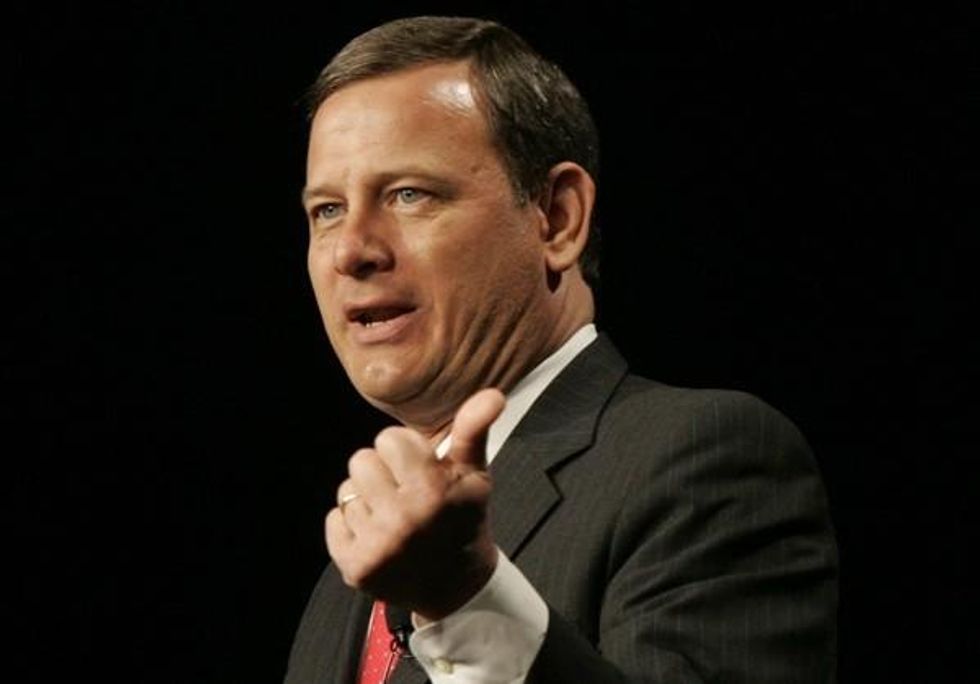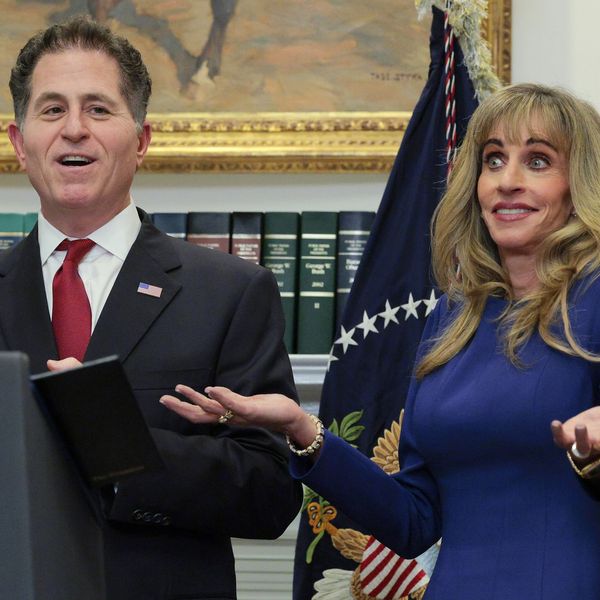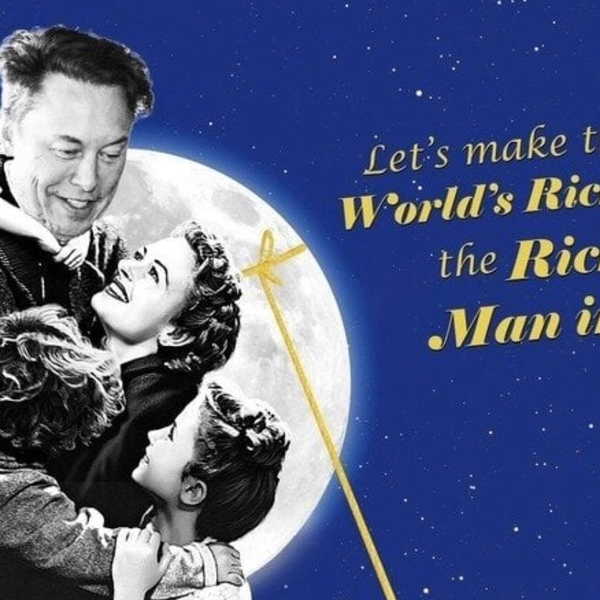A Court of, by and for the 1%
The highest court in the land has spoken. That's how President Obama characterized the Supreme Court's surprising -- and welcome -- decision to uphold the Affordable Care Act, the signature domestic achievement of Obama's first term.
The highest court in the land has spoken. That's how President Obama characterized the Supreme Court's surprising -- and welcome -- decision to uphold the Affordable Care Act, the signature domestic achievement of Obama's first term. With its divided and bitterly contested 5 to 4 ruling, the arch-conservative Roberts Court spared a major piece of progressive legislation and, in the process, rescued the 35 million uninsured Americans who would have suffered, had the law been struck down.

Even with the court's limitations on expanding Medicaid to the states and Chief Justice John Roberts's shameless gutting of commerce clause jurisprudence, the decision was a relief to all who have fought so long for progress.
Right after the highest court in the land spoke, however, one of the lowest forces in the land spoke, too.
Americans for Prosperity, the shadowy conservative super PAC, announced that it would run $8.2 million worth of attack ads to slam health-care reform in nearly a dozen key swing states. No doubt many more of the GOP's secretive sugar daddies will soon follow suit.
It's a reminder that Roberts and his conservative colleagues have not shied away from empowering malignant, moneyed interests who undermine our democracy. Thursday's decision notwithstanding, this is still a court of, by and for the 1 percent.
In fact, last Monday the Supreme Court doubled down on its calamitous Citizens United decision, which unleashed a flood of anonymous, outside, 1 percent spending into our political process.
As Dahlia Lithwick wrote for Slate, rejecting Montana's attempt to curb the corrupt influence of money in politics in American Tradition Partnership v. Bullock showed that "the court's conservatives don't care how much you hate Citizens United ."
It's a shame, because we really do hate Citizens United -- a lot.
Nearly 70 percent of voters think super PACs should be outlawed, and more than half "strongly" do. We can hardly believe that the billionaire brothers David and Charles Koch will spend more this year than John McCain's entire presidential campaign raised in 2008. We can't stand the constant flood of negative ads on every channel or the ominous anonymity of the interests behind them.
The Roberts Court sees all this and refuses to acknowledge that it "give[s] rise to corruption or the appearance of corruption."
Fortunately, if on the question of campaign finance the Supreme Court is immune to the court of public opinion, progressives are fighting through other avenues to transform today's corrupt system into one that is fair, transparent and participatory.
In my home state of New York, Attorney General Eric Schneiderman has launched a path-breaking investigation of tax-exempt groups that might be fraudulently funneling funds into politics, including a "charitable foundation" affiliated with the U.S. Chamber of Commerce.
Meanwhile, New York Gov. Andrew Cuomo (D) is partnering with Protect Our Democracy, a new campaign by political activist Sean Eldridge and his husband, Facebook co-founder Chris Hughes, to apply the same successful, grass-roots pressure they used in getting same-sex marriage passed to our campaign finance system. To create a system that will "reconnect the people to the political process and their government," they have joined with citizen activists who are looking to New York City's successful, multiple-match public financing system. A Brennan Center for Justice study showed that this system promoted diversity among candidates and donors and reduced the influence of corporate money.
And just as Romney's Massachusetts health-care reform became a national model, hopefully New York City's approach will take hold throughout the state, and then across the country. We need to take these robust efforts and fight to implement them at the national level.
That means urging Congress to pass the Disclose Act, which would let citizens know who is behind these secretive super PACs. It means fighting for the Federal Communications Commission's proposed rule requiring major broadcasters to post online the names of the people funding this avalanche of attack ads. It means fighting for shareholder approval to help rein in corporate spending, and continuing to press for the Fair Elections Now Act, which would inject clean public funding into federal campaigns. And it means holding the media accountable for diligent, vigilant reporting on money in politics and on the greatest concentration of wealth and power since the Gilded Age.
Ultimately, nothing short of a constitutional amendment can stem the flood of corporate cash and settle once and for all that corporations are not people and money is not speech. Several have already been introduced in Congress. But the big story since the devastating Citizens United ruling has been the citizens' movement it inspired. As Texas's legendary populist Jim Hightower has written, "Ironically, Citizens United . . . literally united America's citizenry in broad, deep, and vehement opposition to the absurd notion that a corporation is entitled to inclusion as one of us in 'We the People.' "
The mega-millionaires are happily shouting through their big-money megaphones. But on this July 4th, it's worth remembering the words of Thomas Jefferson: "All tyranny needs to gain a foothold is for people of good conscience to remain silent." It's time for "we the people" to raise our voices and to show that, when you keep big money out of the political process, you can bring everyone else in.
An Urgent Message From Our Co-Founder
Dear Common Dreams reader, The U.S. is on a fast track to authoritarianism like nothing I've ever seen. Meanwhile, corporate news outlets are utterly capitulating to Trump, twisting their coverage to avoid drawing his ire while lining up to stuff cash in his pockets. That's why I believe that Common Dreams is doing the best and most consequential reporting that we've ever done. Our small but mighty team is a progressive reporting powerhouse, covering the news every day that the corporate media never will. Our mission has always been simple: To inform. To inspire. And to ignite change for the common good. Now here's the key piece that I want all our readers to understand: None of this would be possible without your financial support. That's not just some fundraising cliche. It's the absolute and literal truth. We don't accept corporate advertising and never will. We don't have a paywall because we don't think people should be blocked from critical news based on their ability to pay. Everything we do is funded by the donations of readers like you. Will you donate now to help power the nonprofit, independent reporting of Common Dreams? Thank you for being a vital member of our community. Together, we can keep independent journalism alive when it’s needed most. - Craig Brown, Co-founder |
The highest court in the land has spoken. That's how President Obama characterized the Supreme Court's surprising -- and welcome -- decision to uphold the Affordable Care Act, the signature domestic achievement of Obama's first term. With its divided and bitterly contested 5 to 4 ruling, the arch-conservative Roberts Court spared a major piece of progressive legislation and, in the process, rescued the 35 million uninsured Americans who would have suffered, had the law been struck down.

Even with the court's limitations on expanding Medicaid to the states and Chief Justice John Roberts's shameless gutting of commerce clause jurisprudence, the decision was a relief to all who have fought so long for progress.
Right after the highest court in the land spoke, however, one of the lowest forces in the land spoke, too.
Americans for Prosperity, the shadowy conservative super PAC, announced that it would run $8.2 million worth of attack ads to slam health-care reform in nearly a dozen key swing states. No doubt many more of the GOP's secretive sugar daddies will soon follow suit.
It's a reminder that Roberts and his conservative colleagues have not shied away from empowering malignant, moneyed interests who undermine our democracy. Thursday's decision notwithstanding, this is still a court of, by and for the 1 percent.
In fact, last Monday the Supreme Court doubled down on its calamitous Citizens United decision, which unleashed a flood of anonymous, outside, 1 percent spending into our political process.
As Dahlia Lithwick wrote for Slate, rejecting Montana's attempt to curb the corrupt influence of money in politics in American Tradition Partnership v. Bullock showed that "the court's conservatives don't care how much you hate Citizens United ."
It's a shame, because we really do hate Citizens United -- a lot.
Nearly 70 percent of voters think super PACs should be outlawed, and more than half "strongly" do. We can hardly believe that the billionaire brothers David and Charles Koch will spend more this year than John McCain's entire presidential campaign raised in 2008. We can't stand the constant flood of negative ads on every channel or the ominous anonymity of the interests behind them.
The Roberts Court sees all this and refuses to acknowledge that it "give[s] rise to corruption or the appearance of corruption."
Fortunately, if on the question of campaign finance the Supreme Court is immune to the court of public opinion, progressives are fighting through other avenues to transform today's corrupt system into one that is fair, transparent and participatory.
In my home state of New York, Attorney General Eric Schneiderman has launched a path-breaking investigation of tax-exempt groups that might be fraudulently funneling funds into politics, including a "charitable foundation" affiliated with the U.S. Chamber of Commerce.
Meanwhile, New York Gov. Andrew Cuomo (D) is partnering with Protect Our Democracy, a new campaign by political activist Sean Eldridge and his husband, Facebook co-founder Chris Hughes, to apply the same successful, grass-roots pressure they used in getting same-sex marriage passed to our campaign finance system. To create a system that will "reconnect the people to the political process and their government," they have joined with citizen activists who are looking to New York City's successful, multiple-match public financing system. A Brennan Center for Justice study showed that this system promoted diversity among candidates and donors and reduced the influence of corporate money.
And just as Romney's Massachusetts health-care reform became a national model, hopefully New York City's approach will take hold throughout the state, and then across the country. We need to take these robust efforts and fight to implement them at the national level.
That means urging Congress to pass the Disclose Act, which would let citizens know who is behind these secretive super PACs. It means fighting for the Federal Communications Commission's proposed rule requiring major broadcasters to post online the names of the people funding this avalanche of attack ads. It means fighting for shareholder approval to help rein in corporate spending, and continuing to press for the Fair Elections Now Act, which would inject clean public funding into federal campaigns. And it means holding the media accountable for diligent, vigilant reporting on money in politics and on the greatest concentration of wealth and power since the Gilded Age.
Ultimately, nothing short of a constitutional amendment can stem the flood of corporate cash and settle once and for all that corporations are not people and money is not speech. Several have already been introduced in Congress. But the big story since the devastating Citizens United ruling has been the citizens' movement it inspired. As Texas's legendary populist Jim Hightower has written, "Ironically, Citizens United . . . literally united America's citizenry in broad, deep, and vehement opposition to the absurd notion that a corporation is entitled to inclusion as one of us in 'We the People.' "
The mega-millionaires are happily shouting through their big-money megaphones. But on this July 4th, it's worth remembering the words of Thomas Jefferson: "All tyranny needs to gain a foothold is for people of good conscience to remain silent." It's time for "we the people" to raise our voices and to show that, when you keep big money out of the political process, you can bring everyone else in.
The highest court in the land has spoken. That's how President Obama characterized the Supreme Court's surprising -- and welcome -- decision to uphold the Affordable Care Act, the signature domestic achievement of Obama's first term. With its divided and bitterly contested 5 to 4 ruling, the arch-conservative Roberts Court spared a major piece of progressive legislation and, in the process, rescued the 35 million uninsured Americans who would have suffered, had the law been struck down.

Even with the court's limitations on expanding Medicaid to the states and Chief Justice John Roberts's shameless gutting of commerce clause jurisprudence, the decision was a relief to all who have fought so long for progress.
Right after the highest court in the land spoke, however, one of the lowest forces in the land spoke, too.
Americans for Prosperity, the shadowy conservative super PAC, announced that it would run $8.2 million worth of attack ads to slam health-care reform in nearly a dozen key swing states. No doubt many more of the GOP's secretive sugar daddies will soon follow suit.
It's a reminder that Roberts and his conservative colleagues have not shied away from empowering malignant, moneyed interests who undermine our democracy. Thursday's decision notwithstanding, this is still a court of, by and for the 1 percent.
In fact, last Monday the Supreme Court doubled down on its calamitous Citizens United decision, which unleashed a flood of anonymous, outside, 1 percent spending into our political process.
As Dahlia Lithwick wrote for Slate, rejecting Montana's attempt to curb the corrupt influence of money in politics in American Tradition Partnership v. Bullock showed that "the court's conservatives don't care how much you hate Citizens United ."
It's a shame, because we really do hate Citizens United -- a lot.
Nearly 70 percent of voters think super PACs should be outlawed, and more than half "strongly" do. We can hardly believe that the billionaire brothers David and Charles Koch will spend more this year than John McCain's entire presidential campaign raised in 2008. We can't stand the constant flood of negative ads on every channel or the ominous anonymity of the interests behind them.
The Roberts Court sees all this and refuses to acknowledge that it "give[s] rise to corruption or the appearance of corruption."
Fortunately, if on the question of campaign finance the Supreme Court is immune to the court of public opinion, progressives are fighting through other avenues to transform today's corrupt system into one that is fair, transparent and participatory.
In my home state of New York, Attorney General Eric Schneiderman has launched a path-breaking investigation of tax-exempt groups that might be fraudulently funneling funds into politics, including a "charitable foundation" affiliated with the U.S. Chamber of Commerce.
Meanwhile, New York Gov. Andrew Cuomo (D) is partnering with Protect Our Democracy, a new campaign by political activist Sean Eldridge and his husband, Facebook co-founder Chris Hughes, to apply the same successful, grass-roots pressure they used in getting same-sex marriage passed to our campaign finance system. To create a system that will "reconnect the people to the political process and their government," they have joined with citizen activists who are looking to New York City's successful, multiple-match public financing system. A Brennan Center for Justice study showed that this system promoted diversity among candidates and donors and reduced the influence of corporate money.
And just as Romney's Massachusetts health-care reform became a national model, hopefully New York City's approach will take hold throughout the state, and then across the country. We need to take these robust efforts and fight to implement them at the national level.
That means urging Congress to pass the Disclose Act, which would let citizens know who is behind these secretive super PACs. It means fighting for the Federal Communications Commission's proposed rule requiring major broadcasters to post online the names of the people funding this avalanche of attack ads. It means fighting for shareholder approval to help rein in corporate spending, and continuing to press for the Fair Elections Now Act, which would inject clean public funding into federal campaigns. And it means holding the media accountable for diligent, vigilant reporting on money in politics and on the greatest concentration of wealth and power since the Gilded Age.
Ultimately, nothing short of a constitutional amendment can stem the flood of corporate cash and settle once and for all that corporations are not people and money is not speech. Several have already been introduced in Congress. But the big story since the devastating Citizens United ruling has been the citizens' movement it inspired. As Texas's legendary populist Jim Hightower has written, "Ironically, Citizens United . . . literally united America's citizenry in broad, deep, and vehement opposition to the absurd notion that a corporation is entitled to inclusion as one of us in 'We the People.' "
The mega-millionaires are happily shouting through their big-money megaphones. But on this July 4th, it's worth remembering the words of Thomas Jefferson: "All tyranny needs to gain a foothold is for people of good conscience to remain silent." It's time for "we the people" to raise our voices and to show that, when you keep big money out of the political process, you can bring everyone else in.

